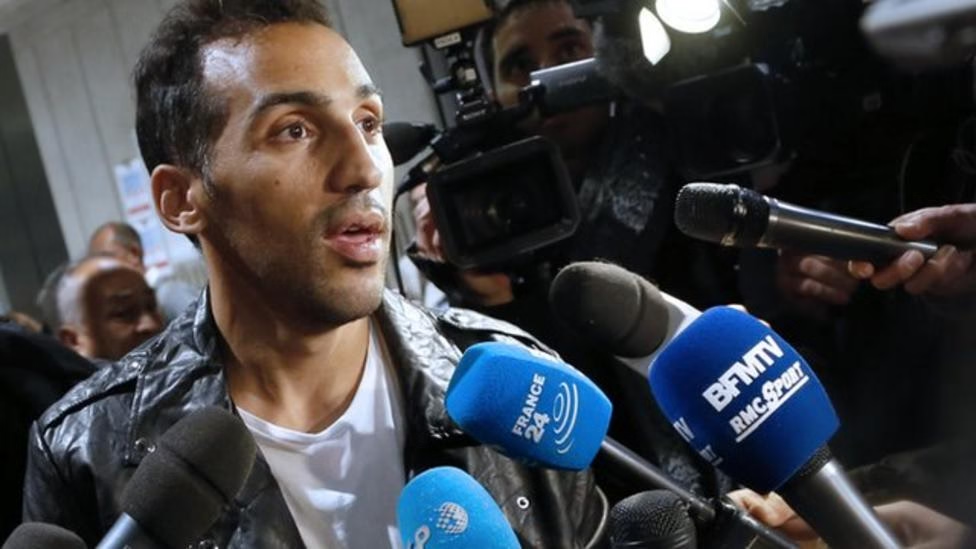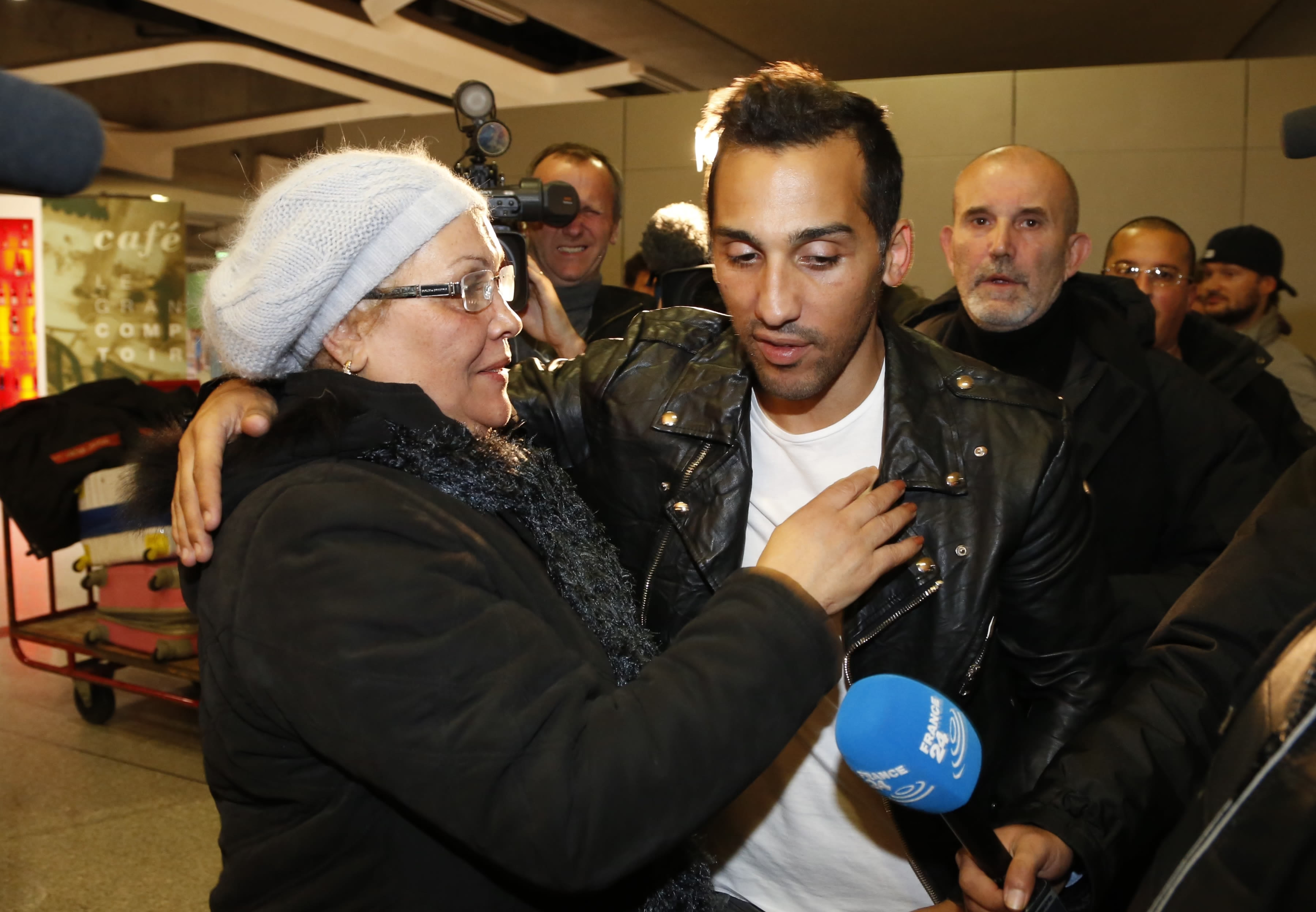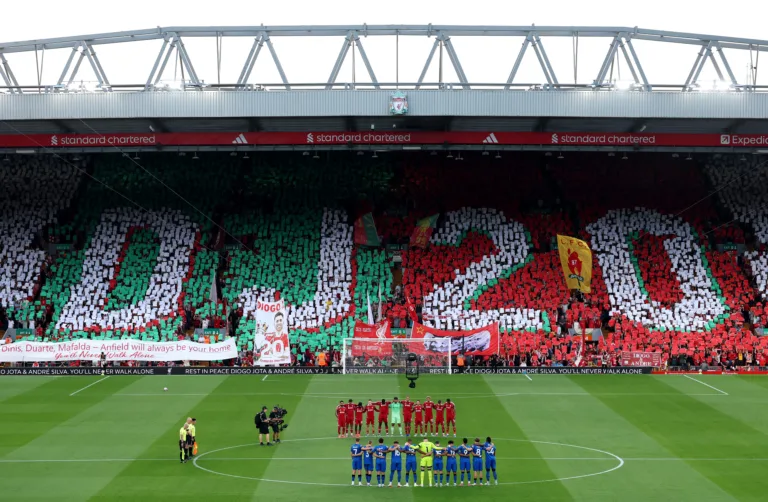Zahir Belounis: The Footballer Who Was Trapped in Qatar
Zahir Belounis glanced at the date on his phone for perhaps the hundredth time that month, each passing day another brutal reminder of his entrapment in a foreign country, far away from home. For 19 relentless months, the French striker was stranded in Qatar, trapped not behind iron bars but by paperwork and bureaucracy that felt even more suffocating. Every morning he woke to the same reality: his future entirely dependent on an employer who refused to let him leave. Without the exit visa, his passport became useless. This scrap of paper simultaneously became his obsession, his tormentor, and his lifeline.
While the world debated air-conditioned stadiums and lavish preparations for the 2022 World Cup, Belounis’s reality was a stark contrast. His ordeal exposed the darker side of Qatari football, laying bare a system that allowed human lives to become bargaining chips in bitter contractual disputes. Behind the glamour, behind the grand plans and international promises, Zahir Belounis became the unwilling face of a labour crisis simmering beneath the surface. One man’s personal nightmare reflected a wider story of exploitation that few wanted to acknowledge, and few still do today.
From Lower-League Journeys to Gulf Glitter
Belounis’s early career was modest, the very definition of journeyman football. He started out with Noisy-le-Sec, a small French side, before joining FC Balagne in 2001. From there, moves followed regularly: FC Saint-Lô, then an overseas stint at T. Malaysia FC, before returning to Europe again with FC La Tour. His steady movement across these clubs was typical of lower-league football, chasing the next opportunity wherever it presented itself.
In 2007, when Qatari club El Jaish offered him a chance to swap the quiet pitches of Switzerland’s FC La Tour for the rapidly growing football scene in the Gulf, it seemed a perfect move. Tax-free earnings, free accommodation, and a lifestyle previously enjoyed by stars like Gabriel Batistuta, Pep Guardiola and Marcel Desailly were all part of the package. For a player accustomed to grinding through lower-tier football, the move felt like winning the lottery.
Initially, life in Qatar exceeded expectations. El Jaish appreciated his contribution, appointing him as captain and rewarding his commitment when the team successfully achieved promotion. In 2010, convinced of his value, the club handed him a new five-year deal that seemed to promise stability for years to come. But Belounis could never have anticipated the ordeal waiting just around the corner.
Ticking Clocks and Quiet Threats
The dream cracked in late 2011. The club signed one overseas player too many, breaching roster limits, and loaned Belounis to second‑tier Al Markhiya. By spring 2012 his salary began arriving late; by June it stopped altogether. When he asked why, officials muttered about “internal restructuring” and other reasons. He filed a claim with Qatar’s Labour Court, confident the contract was bulletproof. That choice would backfire horribly.
“You’re no longer part of the club.”
When Zahir Belounis was asked why El Jaish had decided to loan him out and how he became an afterthought, he said:
“I don’t know why. I think because they had bigger-name signings. I pointed out I had a contract and they said they’d pay me but they didn’t. Then when I took legal action, they refused to give me the exit visa. My wife and daughters went back to Paris in the summer and were planning to stay until I could join them, but I wasn’t well and I sought solace in alcohol.
“When my wife heard me on the phone, she came straight back. I have known her for 18 years and this has made us even more in love but it’s been hard on my family. That’s the thing that kills me: the suffering of my family, particularly my girls.”
What Belounis didn’t understand was how quickly disputes could become personal in Qatar’s football bureaucracy. Once he raised a legal challenge, communication from El Jaish grew cold, then stopped entirely. Emails were left unanswered; phone calls were diverted to voicemails that never called back. With alarming clarity, he realised he was being deliberately frozen out.
Initially optimistic, he regularly checked his phone, convinced any moment the club would relent. Weeks dragged into months with no progress. Quietly, friends and acquaintances began to advise caution, gently suggesting he might be provoking powerful figures. His lawyer warned him subtly that pursuing the case would have consequences, hinting at stories of others who regretted similar battles. Still, Belounis trusted the system would side with him.
Then came the first direct threats, not shouted or openly aggressive, but softly menacing. Officials began implying that the longer he persisted, the harder life could become for him and his family. Veiled warnings emerged in casual conversation: suggestions that visas could be revoked, housing withdrawn, or children’s school placements cancelled.
Anxiety consumed him. His sleep grew fractured, and every noise at night startled him awake. He began to recognise cars loitering near his building and figures lingering too long near his training pitches. Whether real or imagined, paranoia took hold, slowly eroding his mental resilience. He questioned whether the fight was worth it, but stubborn pride and a lingering belief in fairness kept him going.
Each passing day felt like another step deeper into quicksand. With dwindling finances and diminishing support, Belounis understood too late that Qatar’s legal mechanisms, far from providing justice, had become another tool of control, one more quiet threat in an already deafening silence.
Anatomy of the Kafala Bind
So just how did it get this bad for Zahir Belounis?
Under the Kafala system every expatriate worker is tethered to a local sponsor. You need that sponsor’s blessing to switch jobs, renew your ID card, even leave the country. Without it, you are a bird in a gilded cage. Employers often confiscate passports “for safekeeping”. In Belounis’ case, the very club he was suing retained the power to sign his exit papers. Predictably, they refused.
Belounis discovered that while the case sat in the Qatari courts, FIFA would not intervene because he had not first lodged with its Dispute Resolution Chamber. Lawyers told him running simultaneous proceedings could invalidate both. He was trapped in procedural limbo.
Living on Fumes
By autumn 2012 the money was gone. He flogged his TV, sofa and even his medal collection to cover rent on a modest flat in Al Sadd. Nights were spent on a thin mattress with the air conditioning switched off to save electricity. Friends slipped him grocery bags. Pride stopped him from telling his parents how bad it was.
The physical impact was brutal. Weight dropped, energy levels collapsed, and dehydration became a constant threat in 45‑degree heat. Mentally it was worse. Belounis later told CNN he drank to “stop the black ideas”. The French embassy provided consular support but could not override Qatari law.
“They have destroyed my life,” he says. “By the end I was crying every day. When you think about suicide and killing yourself, it is difficult.”
A One‑Man PR War
In November 2013, exhausted and desperate, he penned an open letter to 2022 World Cup ambassadors Zinedine Zidane and Pep Guardiola. He begged them to “please speak up” about a system “slowly killing me”. The Guardian published it in full, and within hours, his name trended on French Twitter. FIFPro issued a statement calling the situation “unacceptable”. Amnesty International used the story to illustrate wider abuses faced by the 1.4 million migrant workers building World Cup infrastructure.
Mainstream media, hungry for World Cup‑related angles, lit up. BBC Sport’s Ben Smith flew to Paris to interview Belounis’ brother Mahdi, who revealed the family had mortgaged their home to keep the children in nappies. In Westminster, Damian Collins MP referenced the saga during a Culture, Media and Sport Committee hearing, branding Kafala “a stain on football’s conscience”.
Zahir Belounis’ Letter In Full to Zinedine Zidane and Pep Guardiola
Mr Zidane and Mr Guardiola,
My name is Zahir Belounis and I am a French professional footballer.
After a legal dispute with my club, I am being prevented from returning home to France.
I haven’t seen my family in France since June 2012 because my employer refuses to give me the exit visa needed to leave the country. This is a special document that only exists in this country and Saudi Arabia.
I am not alone in this predicament. Many workers who are to build the stadiums for the 2022 World Cup risk finding themselves in the same situation as me.
When someone suggested that I write to you, I figured that you have been great footballers but also great men so I would appeal to you to use your renown to intervene, or try to intervene, to end the impasse.
I know that you have many demands for your time but I ask you to please help me. Please understand that I am a victim.
I know that you served as ambassadors for Qatar’s 2022 World Cup bid. You did this with good intentions but the reality is that if Qatar does not scrap its “exit visa” system, then there will be hundreds, maybe thousands, of people trapped here.
Before these problems I was a happy man in Doha. My two daughters were born here and I know that many Qataris are working hard to make this an unforgettable World Cup and I am sure that it will be! The Middle East deserves to host this global event because it is a unique way to bring people together to enjoy a fraternal celebration between nations. On the other hand, and in spite of all the good things that I could say about this country that has a sincere desire to do great things, I have been living a nightmare for several months because of the kafala system. This system is slowly killing me and many other people risk suffering in the same way. I am well placed to speak about it because I am completely bound up in it, so I take this opportunity to demand change for a better world …
I ask you to use your influence as football ambassadors to talk about what is happening to me and what is happening to many other young men here in Qatar. People are being kept far from their countries because of the exit visa system. This system should not exist and we need people like you, who love sport and its [good] image, to make our voices heard.
You know what it is like to have children. Imagine what I am going through every day in a house that is half-empty – because when they promised me that they would give me my exit visa, I sold my furniture – and when I see the look in my daughters’ eyes, I feel ashamed, I feel disgusted with myself for inflicting such conditions on them.
I speak to you as fathers and as former footballers and I ask you, please speak up and do what you can to help me get home.
Kind regards,
Zahir Belounis
Legal Dead Ends and Lonely Nights
Behind the headlines, the legal process crawled. Hearings were postponed without explanation. Court documents were available only in Arabic, and translators cost money Belounis no longer had. Each Sunday he reported to the Immigration Department hoping for a breakthrough. Each time, the same answer: “Come back next week.”
He considered fleeing across the desert into Saudi Arabia, a route used by some South Asian labourers. Friends warned that capture would mean jail and a lifetime ban from the Gulf. Suicide entered his thoughts. He later admitted he kept a rope in the wardrobe “just to know the option existed”.
Allies and Absentees
Belounis learnt quickly who his friends were. His open letter to Zinedine Zidane and Pep Guardiola was met with silence, the kind that echoed louder than any response. Yet, amid the disappointing absences of such high-profile ambassadors, a surprising ally emerged.
Arsène Wenger, renowned Arsenal manager and respected figure in world football, took up the cause. When news reached Wenger of Belounis’s desperate situation, he publicly spoke out, urging FIFA to address Qatar’s controversial kafala system directly. Wenger condemned the system as deeply unfair, emphasising that the situation had become too grave to ignore, and suggested FIFA had an obligation to intervene decisively.
But Wenger didn’t stop at statements alone. Quietly, he reached out directly to Belounis’s family, providing them with moral support and practical advice. Wenger’s intervention boosted morale enormously, offering rare hope during Belounis’s lowest moments. His voice carried weight not just due to his footballing credentials but because he spoke from a genuine place of empathy, clearly shocked by Belounis’s circumstances.
“Fifa has made an investigation and hopefully will sort that out,” said Wenger. “It is down to Fifa to make those rules changed.”
“I have been contacted by somebody from the family who asked for help, but what I’ve heard in France is that the French government is involved and they are in a much stronger position than anybody else to help out. I am just surprised he cannot get out of the country and I don’t know why really.”
Wenger’s advocacy also amplified pressure on Qatar from outside the football world, adding to growing international calls from the European Parliament and Amnesty International for urgent reforms. FIFA felt renewed pressure to confront the conditions that had led to Belounis’s plight.
Support arrived from unlikely corners. A Qatari businessman paid three months’ rent anonymously after reading the open letter. Abdeslam Ouaddou, another former Ligue 1 player trapped in a similar dispute, visited every Friday with fresh bread and words of solidarity.
“I am so happy for Zahir to come home but the real victory will be when the kafala system ends,” said Ouaddou, a Moroccan who played for several French clubs and England’s Fulham before moving to the emirate in 2010.
“If they don’t change kafala, then they should change where the World Cup is,” Ouaddou told CNN.
Meanwhile, FIFA president Sepp Blatter told reporters in Kuala Lumpur that European media were “attacking” Qatar. Privately he invited Belounis to Zurich in March 2014 but offered only sympathy, not practical help.
“They destroyed me. I was depressed. Nobody cares about that. I met Sepp Blatter in March when he invited me to Zurich,” he said. “He told me he was sorry for me and that it was difficult. But that was it. I have heard nothing since.”

Media Pressure Peaks
By mid‑November 2013, with the 2022 hosts already under scrutiny for searing summer temperatures and bribery allegations, the Belounis affair threatened to become a PR meltdown. French president François Hollande raised the case during a bilateral meeting with Emir Sheikh Tamim. The International Trade Union Confederation predicted up to 4,000 migrant deaths before the World Cup if reforms lagged.
Qatar’s authorities insisted the footballer could leave at any time if he withdrew his court claim. He refused, fearing it would nullify any chance of back pay. Journalists on the ground confirmed rumours that the Ministry of Labour wanted the stand‑off resolved before it damaged a planned bid for the 2019 Athletics World Championships.
Finally, a Stamp of Freedom
At 14:00 on 27 November 2013 the call came: “Tomorrow, collect your exit visa.” No explanation, no apology, just an instruction. Belounis sprinted to the immigration office, collected a stamped form, and rushed home to pack six suitcases and a box of children’s toys. He did not sleep. At dawn the family drove to Hamad International, hearts pounding. Only when the officer stamped their passports did relief flood in.
“I have lost everything. Now I want to come back to my country. Give me my freedom. Here you can stop someone leaving if they have done something, made a mistake [ie, committed a crime]. I have nothing against me. Nothing, nothing, nothing.”
The next evening he walked through the sliding doors at Charles de Gaulle into a wall of cameras. His mother clutched him like a returned soldier. The image went viral, a human face on a policy glitch.
“Thank you, Mr President! Thank you, FIFPRO! It was FIFPRO that looked after my accommodation in Qatar, when I didn’t have anything left, no more furniture, no more money to keep my family alive.”
“It was after the message from FIFPRO calling for my release that things really got moving.”
“I hadn’t done anything wrong, I didn’t break any law or commit any crime. I’m not a symbol, just a footballer who wanted to keep my family alive by practicing my profession. Just a man who said no, who wanted to be respected. A man they tried to break!”
Belounis remarks about FIFPRO President Philippe Piat
Picking Up the Pieces
Freedom brought relief, not riches. The unpaid salary, around £120,000, remained contested. Re‑entering professional football was still the dream; two French clubs invited him to train but medical staff flagged anxiety issues.
“If I could just play again, even just for one minute, I wouldn’t fear anything; I could even walk on to the pitch at Old Trafford and not be afraid,” he says, as if facing Manchester United fans is the most terrifying prospect he can imagine.
“I hope I can persuade a club president to give me a chance. I know it’s mad, but I need a man who’s just mad enough to give me a chance, for six months, for a minute. I don’t want to end my career like this. It’s too sad.”
Unfortunately for Belounis, his football career ended in Qatar. In 2014 he moved to Málaga and worked as a waiter at a friend’s restaurant. “In life you have to work,” he shrugged.
Four years later mediation by the newly formed Qatar Players’ Association produced a confidential settlement. The sum cleared his debts and funded a coaching badge. He now runs youth sessions in suburban Paris, telling teenagers to read every contract clause twice.
Ripples Beyond One Man
Belounis’ ordeal accelerated scrutiny of Kafala. Under mounting international pressure, Qatar announced phased reforms: electronic wage protection in 2015, exit‑visa abolition for most workers in 2018, and a new minimum wage in 2021. The International Labour Organisation calls progress “meaningful but incomplete”. Passport confiscation persists, and some firms use forged “no‑objection certificates” to block job moves.
For footballers, the QFA established a domestic dispute committee modelled on FIFA’s tribunal, promising decisions within 30 days. Yet players’ union reps say enforcement is patchy, especially for those outside the top tier.
The Greater Impact: Kafala, Slave Labour, and Migrant Deaths
Zahir Belounis’s ordeal was deeply personal, but it exposed a disturbing truth far beyond football’s boundaries. The Kafala system didn’t just ensnare professional athletes, it affected millions of migrant labourers working in the sweltering Gulf heat, often in conditions that bordered on modern slavery.
Since Qatar secured the hosting rights for the 2022 World Cup, human rights groups repeatedly sounded alarms about the treatment of migrant workers. Reports from Amnesty International and Human Rights Watch detailed horrific working conditions, from construction sites operating in blistering 50-degree heat without adequate rest periods, to cramped, unsanitary living quarters shared by dozens of exhausted men.
Death rates among migrant workers painted a grim picture. In 2021, The Guardian reported over 6,500 deaths among labourers from countries like India, Nepal, Pakistan, and Bangladesh since Qatar’s World Cup award in 2010. Many were listed as “natural causes,” yet further investigation revealed widespread patterns of heat stress, exhaustion, and neglect, lives lost building glittering stadiums these workers would never set foot inside.
The scale of this suffering placed Belounis’ situation into a stark, broader context. He became a face for countless others without a voice, trapped under the weight of a system designed for exploitation. His struggle provided a platform for human rights advocates to demand change, urging Qatar and FIFA to reform laws and hold corporations accountable.
While reforms eventually arrived, critics argue they’re still insufficiently enforced, allowing exploitation to persist under different names and subtler practices. Migrants remain vulnerable, their voices rarely heard unless tragedy strikes loudly enough to break through the global news cycle.
Belounis’ battle for freedom wasn’t only about a footballer wronged by his club; it represented a harsh spotlight on a system that commodified human lives in the pursuit of prestige and profit. As Qatar continues to enjoy global sporting spotlight, the lingering question remains: how many more lives will quietly slip away before lasting reform truly takes hold?
And the fear right now, this is happening in Saudi Arabia too. History is repeating itself in front of our very eyes, and people are continuing to ignore it in spite of what has happened in the past. For all the glamour of the sporting events being hosted in Riyadh, more migrants from developing countries will die due to the power struggle in these states.
I paid US$1,115 in recruitment fees to the agent which I borrowed from relatives at 42 percent interest rate. I was told that I would be working as a waiter in a hotel but was instead placed as a labourer in a furniture factory where I had to carry loads. It was not per my contract. My [promised] monthly salary was SAR 1200 [$346] for eight hours, but I had to work 14 hours a day. I was paid on time for the first two months but was never paid on time thereafter. When I asked my manager for my payment, he would answer, ‘Die first, and I’ll pay you later.’
A former Saudi Arabia-based migrant worker from Nepal
Why the Zahir Belounis Qatar Story Still Matters
There were bigger names at the 2022 World Cup, brighter lights at the final whistle, but the experience of Zahir Belounis in Qatar remains a warning to clubs, agents and governing bodies. When a striker earning far more than the average builder can be held hostage for nineteen months, imagine the leverage over a scaffolder earning £6 a day. His saga showed how easy it is for paperwork to become shackles when power is lopsided.
The case also exposed holes in FIFA’s player‑protection net. The Dispute Resolution Chamber resolves claims only when players file correctly. A multilingual template, pinned on every dressing‑room wall, could prevent others from falling into jurisdictional cracks.
Lessons for the Game
Football, like any workplace, runs on contracts that must be honoured. The story of Zahir Belounis in Qatar shows what happens when promised rights meet absolute power. It should prompt every club, federation and fan to remember that talent crosses borders, but dignity must cross with it. This is still happening right now in Saudi Arabia, with Al-Orobah FC failing to pay TNS for their star striker Brad Young. There have been reports that multiple clubs have not been paying wages and when clubs from countries that hold power over the person’s life rather than the contract being the most important factor, this will continue to be the case.
Zahir Belounis’ story shouldn’t be forgotten, it is of a man who went to a country with the promise of a better life, and it ended with his life being ruined. For Zahir Belounis, he is a pioneer, but according to his mother, “he is the symbol of this human disaster.” We cannot let people forget about these stories so they don’t repeat themselves.
Even though, they’re likely still happening right now.








